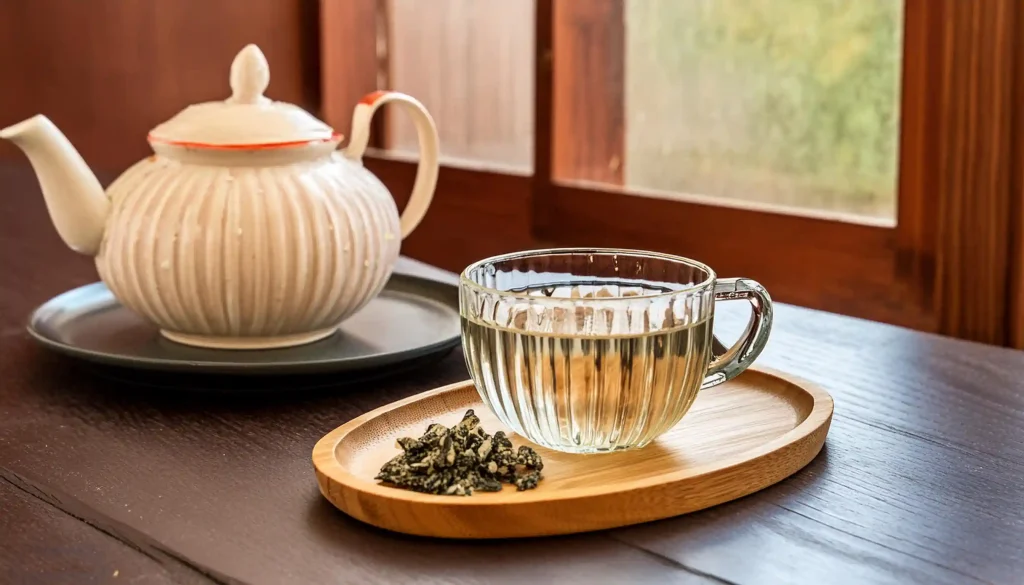Tea is more than just a beverage; it’s a journey through history, culture, and personal experience. Among the diverse varieties of tea, white tea stands out as a gentle, refined choice that offers a unique blend of subtle flavors and numerous health benefits. Having spent years exploring various teas, white tea has become a personal favorite, not just for its delicate taste but for the tranquility it brings. In this article, I’ll share my journey with white tea, its origins, health benefits, and some suggestions for fellow tea enthusiasts looking to explore this exquisite tea.
My journey with white tea began in a small tea shop in the heart of an ancient Chinese town. The shop, filled with the earthy aroma of dried leaves, introduced me to a world where tea is more than just a drink. The shop owner, an elderly man with decades of tea experience, offered me a cup of Bai Hao Yin Zhen, or Silver Needle, one of the most prized white teas. The first sip was a revelation – a delicate, almost ethereal flavor that was worlds apart from the robust black teas and the grassy green teas I was accustomed to. That experience sparked a deep curiosity and love for white tea that continues to this day.
What is White Tea
White tea, produced from the young leaves and buds of the Camellia sinensis plant, is among the least processed varieties of tea. The leaves are harvested before they fully open, while they are still covered in fine white hairs – hence the name “white tea.” The minimal processing involves simply plucking, withering, and drying the leaves, preserving the natural flavors and health benefits.
Types of White Tea
White tea comes in a variety of forms, each with its own special qualities:
- Silver Needle (Bai Hao Yin Zhen): This is the most famous and prized white tea, made exclusively from the buds of the tea plant. It has a light, sweet flavor with hints of honey and melon.
- White Peony (Bai Mudan): This tea includes both the buds and the first few leaves. It has a stronger flavor than Silver Needle, with floral and fruity notes.
- Long Life Eyebrow (Shou Mei): This tea is made from leaves that are left over after the Silver Needle and White Peony harvests. It has a darker color and a stronger flavor, with a hint of nuttiness.
- Tribute Eyebrow (Gong Mei): Comparable to Shou Mei, although thought to be of somewhat better quality. It has a robust flavor and a darker brew.
Brewing White Tea
Brewing white tea is an art that requires attention to detail to fully appreciate its delicate flavors. Here’s a step-by-step guide to brewing the perfect cup of white tea:
- Water Quality: Use fresh, filtered water. Avoid distilled or heavily chlorinated water, as they can affect the taste.
- Temperature: White tea should be brewed at a lower temperature compared to black or green tea. The ideal temperature is between 160°F to 185°F (70°C to 85°C).
- Tea to Water Ratio: Use about 2 grams of tea per 8 ounces of water. This can be adjusted based on personal preference.
- Brewing Time: Steep the tea for 2 to 5 minutes. Shorter steeping times will result in a lighter flavor, while longer times will bring out more robust notes.
- Multiple Infusions: White tea can be steeped multiple times. With each infusion, new flavors and aromas can be discovered, making it a rewarding experience.
Health Benefits of White Tea
White tea is not just a treat for the palate; it also offers a wealth of health benefits. Here are some of the main benefits:
- Rich in Antioxidants: White tea is packed with antioxidants, particularly catechins and polyphenols, which help combat oxidative stress and reduce the risk of chronic diseases. The minimal processing of white tea preserves a higher concentration of these antioxidants compared to other teas.
- Supports Heart Health: Regular white tea drinking has been associated with better cardiovascular health. The antioxidants in white tea help reduce LDL cholesterol levels and improve artery function, reducing the risk of heart disease.
- Promotes Weight Loss: White tea can be a valuable addition to a weight loss regimen. It has been shown to boost metabolism and promote fat oxidation. White tea can also aid in preventing the development of new fat cells.
- Enhances Skin Health: The antioxidants in white tea also offer benefits for the skin. They lessen aging signs by shielding the skin from harm brought on by free radicals. White tea extracts are often used in skincare products for their anti-aging properties.
- Improves Oral Health: White tea contains fluoride, tannins, and catechins, which help maintain oral health. These compounds can strengthen teeth, reduce the risk of cavities, and inhibit the growth of bacteria responsible for plaque formation.
- Boosts Mental Alertness: White tea contains a moderate amount of caffeine, which can enhance mental alertness without the jitters associated with higher caffeine levels in coffee or black tea. It also contains the amino acid L-theanine, which promotes relaxation and reduces stress.
Personal Experiences with White Tea
Over the years, white tea has become a staple in my daily routine. I’ve experimented with different types and brands, each offering a unique experience. Here are some of my personal favorites and tips for enjoying white tea to the fullest:
Afternoon Delight: In the afternoons, I often switch to White Peony. Its slightly stronger flavor and floral notes make it a perfect mid-day refreshment. I usually pair it with a light snack, like a fruit salad or some almonds. The combination of flavors is both satisfying and rejuvenating.
Evening Relaxation: For evening relaxation, Shou Mei is my go-to choice. Its deeper, nuttier flavor is comforting, especially during cooler months. I often brew a pot and sip it slowly while reading or meditating. It is a fantastic way to relax at the end of the day.
Hosting Friends: When hosting friends, I enjoy sharing the experience of white tea. I set up a simple tea station with different types of white tea, allowing guests to explore and discover their favorites. It’s always a hit, and the conversations that unfold over a pot of tea are priceless. For those who are new to white tea, I recommend starting with White Peony for its approachable flavor.
Tips for Buying White Tea
When buying white tea, quality matters. Here are some tips to ensure you’re getting the best:
- Source: Look for reputable suppliers who specialize in high-quality teas. The best white teas often come from Fujian Province in China, where the tradition of white tea production dates back centuries.
- Appearance: A superior white tea has to seem lively and fresh. The leaves and buds should be whole, not broken, and covered in fine white hairs.
- Aroma: Good white tea should have a fresh, slightly sweet aroma. Avoid teas that smell stale or overly grassy.
- Packaging: White tea is delicate and should be stored properly to maintain its freshness. Look for tea that is packaged in airtight containers or resealable bags to protect it from light, air, and moisture.
White Tea and Culinary Creativity
White tea is not just for drinking; it can also be a wonderful ingredient in cooking. Here are a few culinary ideas to incorporate white tea into your meals:
- White Tea Infused Rice: Infuse your rice with white tea for a subtle, aromatic flavor. Simply steep a few teaspoons of white tea in hot water, strain, and use the tea to cook your rice as usual. This works particularly well with jasmine or basmati rice.
- White Tea Poached Pears: Poach pears in a mixture of white tea, honey, and a touch of vanilla for a light, elegant dessert. The delicate flavor of the white tea pairs beautifully with the sweetness of the pears.
- White Tea Vinaigrette: Create a unique salad dressing by blending white tea with olive oil, vinegar, honey, and a dash of mustard. This light, refreshing vinaigrette is perfect for summer salads.
For those new to white tea, I encourage you to explore and experiment. Each type of white tea offers a different experience, and the journey of discovery is part of the joy. Remember to pay attention to the quality of the tea you buy, and take the time to brew it properly to fully appreciate its delicate flavors.
As someone who has traveled through the world of tea, I can attest to the special place white tea holds. Its subtlety and sophistication make it a perfect choice for those looking to find peace and pleasure in a cup. So, brew yourself a pot of white tea, sit back, and enjoy the serene experience it brings.

